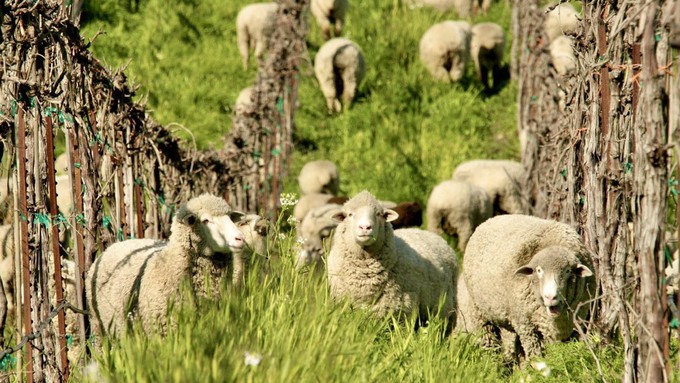
Sacramento Speakers Series supports scholarships for future farmers and more

Matchbook Wine Co. uses sheep as natural weed-eaters between its vines. Hear Lane Giguiere, owner of the Yolo winery, and other woman in agriculture talk about their work. Courtesy Matchbook Wine Co.
What local gardener hasn’t daydreamed about farming? But what does it take to be a sustainable farmer in the Farm-to-Fork Capital?
How do you grow wine with less waste? What about raising happy cows in healthy pastures? Where can you study to be a sustainable farmer and get some hands-on practice?
Find out at this special event – “Women in Agriculture: Celebrating Sustainable Production.” Set for 5:30 p.m. Wednesday, Feb. 21, this scholarship fundraiser will be held at the Event Center by Bella Bru at the Milagro Centre, 6241 Fair Oaks Blvd., Carmichael.
Tickets are $50 in advance via Eventbrite, $60 at the door. Admission includes one drink coupon and appetizers.
Proceeds from the event will go toward scholarships and grants for women interested in careers in agriculture or the food and beverage industry. The evening is hosted by the Sacramento Chapter of Les Dames d’Escoffier.
As part of the Les Dames’ Sacramento Speakers Series, an expert panel will share “insights on the people, principles, programs and practices that contribute to a sustainable food system.”
The panel includes: Lane Giguiere, owner of Matchbook Wine Co. in Yolo County; Mary Kimball, CEO of Center for Land-Based Learning; and Karen Stone, manager of Yolo Land and Cattle Co. Food expert, author and nutritionist Amy Myrdal Miller will serve as moderator.
This panel also has lessons that can apply to backyard farmers. Sustainable agriculture protects the environment while working with the land. These methods promote natural resources and help wildlife, too.
It’s sure to be a thoughtful and interesting evening, dedicated to the future of local agriculture. Tickets are available at Eventbrite (https://bit.ly/3O5i9vh).
Comments
0 comments have been posted.Sacramento Digs Gardening to your inbox.
Food in My Back Yard Series
May 6: Maintain soil moisture with mulch for garden success
April 29: What's (already) wrong with my tomato plants?
April 22: Should you stock up on fertilizer? (Yes!)
April 15: Grow culinary herbs in containers
April 8: When to plant summer vegetables
April 1: Don't be fooled by these garden myths
March 25: Fertilizer tips: How to 'feed' your vegetables for healthy growth
March 18: Time to give vegetable seedlings some more space
March 11: Ways to win the fight against weeds
March 4: Potatoes from the garden
Feb. 25: Plant a fruit tree now -- for later
Feb. 18: How to squeeze more food into less space
Feb. 11: When to plant? Consider staggering your transplants
Feb. 4: Starting in seed starting
Sites We Like
Garden Checklist for week of May 11
Make the most of the lower temperatures early in the week. We’ll be back in the 80s by Thursday.
* Plant, plant, plant! It’s prime planting season in the Sacramento area. Time to set out those tomato transplants along with peppers and eggplants. Pinch off any flowers on new transplants to make them concentrate on establishing roots instead of setting premature fruit.
* Direct-seed melons, cucumbers, summer squash, corn, radishes, pumpkins and annual herbs such as basil.
* Harvest cabbage, lettuce, peas and green onions.
* In the flower garden, direct-seed sunflowers, cosmos, salvia, zinnias, marigolds, celosia and asters. (You also can transplant seedlings for many of the same flowers.)
* Plant dahlia tubers.
* Transplant petunias, marigolds and perennial flowers such as astilbe, columbine, coneflowers, coreopsis, dahlias, rudbeckia and verbena.
* Keep an eye out for slugs, snails, earwigs and aphids that want to dine on tender new growth.
* Feed summer bloomers with a balanced fertilizer.
* For continued bloom, cut off spent flowers on roses as well as other flowering plants.
* Add mulch to the garden to maintain moisture. Mulch also cuts down on weeds. But don’t let it mound around the stems or trunks of trees or shrubs. Leave about a 6-inch-to-1-foot circle to avoid crown rot or other problems.
* Remember to weed! Pull those nasties before they set seed.
* Water early in the day and keep seedlings evenly moist.